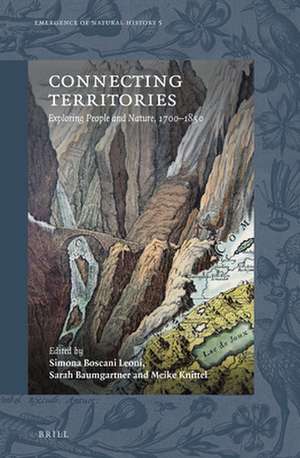Connecting Territories: Exploring People and Nature, 1700–1850: Emergence of Natural History, cartea 5
Contribuţii de Stefanie Gänger, Francesco Luzzini, Jon Mathieu, Barbara Orland, Irina Podgorny, Chetan Singh, Martin Stuber Simona Boscani Leoni, Sarah Baumgartner, Meike Knittelen Limba Engleză Hardback – dec 2021
Contributors are: Sarah Baumgartner, Simona Boscani Leoni, Stefanie Gänger, Meike Knittel, Francesco Luzzini, Jon Mathieu, Barbara Orland, Irina Podgorny, Chetan Singh, and Martin Stuber.
Preț: 605.48 lei
Preț vechi: 738.39 lei
-18% Nou
Puncte Express: 908
Preț estimativ în valută:
115.86€ • 121.83$ • 95.73£
115.86€ • 121.83$ • 95.73£
Carte indisponibilă temporar
Doresc să fiu notificat când acest titlu va fi disponibil:
Se trimite...
Preluare comenzi: 021 569.72.76
Specificații
ISBN-13: 9789004412460
ISBN-10: 9004412468
Dimensiuni: 155 x 235 mm
Greutate: 0 kg
Editura: Brill
Colecția Brill
Seria Emergence of Natural History
ISBN-10: 9004412468
Dimensiuni: 155 x 235 mm
Greutate: 0 kg
Editura: Brill
Colecția Brill
Seria Emergence of Natural History
Notă biografică
Simona Boscani Leoni, Ph.D. (2003, EHESS Paris), is Swiss National Science Foundation-Professor of Early Modern History at the University of Bern and senior scientist at the Swiss Federal Institute of Technology Lausanne. Most recently she edited “Unglaubliche Bergwunder”. Johann Jakob Scheuchzer und Graubünden. Ausgewählte Briefe, 1699–1707 (2019); an extended edition of this correspondence can be found online: https://hallernet.org.
Sarah Baumgartner, Ph.D. (2019, University of Bern) holds an MA in History and a BSc in Geography. Her research interests include the history of scientific societies of the eighteenth century and early modern agriculture.
Meike Knittel, Ph.D. (2018, University of Bern), is a postdoctoral researcher at the Museum für Naturkunde Berlin and an associated researcher at the University of Bern’s Historical Institute. Her research focuses on natural history of collections and eighteenth-century botany.
Sarah Baumgartner, Ph.D. (2019, University of Bern) holds an MA in History and a BSc in Geography. Her research interests include the history of scientific societies of the eighteenth century and early modern agriculture.
Meike Knittel, Ph.D. (2018, University of Bern), is a postdoctoral researcher at the Museum für Naturkunde Berlin and an associated researcher at the University of Bern’s Historical Institute. Her research focuses on natural history of collections and eighteenth-century botany.
Cuprins
Contents
List of Figures and Tables
List of Contributors
1 Introduction: From Switzerland to the Indies
Simona Boscani Leoni, Sarah Baumgartner and Meike Knittel
2 Between the Americas and Europe: Mapping Territories through Questionnaires, 16th–18th Centuries
Simona Boscani Leoni
3 (Re-)Shaping a Method: Field Research and Experimental Legacy in Vallisneri’s Primi Itineris Specimen (1705)
Francesco Luzzini
4 Flora Near and Far: Accumulating Knowledge on Plants in Eighteenth-Century Zurich
Meike Knittel
5 The Secrets of Indians: Native Knowers in Enlightenment Natural Histories of the Southern Americas
Stefanie Gänger
6 Change and Continuity: The Bureaucracy of Knowledge in South America
Irina Podgorny
7 Questionnaires, Parish Registers and Prize Competitions: The Zurich Physical Society’s Sources and Methods for Surveying the Territory
Sarah Baumgartner
8 Social Anthropology avant la lettre: The Economic Enlightenment Perspective on Traditional Uses of Wetlands
Martin Stuber
9 Divergent Perception: Deserts and Mountains in Transition to Modernity, seen through Alexander von Humboldt’s Views of Nature
Jon Mathieu
10 Alpine Landscapes of Health: The Swiss Whey Cure and Therapeutic Tourism between 1750 and 1870
Barbara Orland
11 Creation of “Scientific” Knowledge: The Asiatick Society and Exploration of the Himalaya, 1784–1850
Chetan Singh
Index
List of Figures and Tables
List of Contributors
1 Introduction: From Switzerland to the Indies
Simona Boscani Leoni, Sarah Baumgartner and Meike Knittel
part 1: Naturalists’ Methods
2 Between the Americas and Europe: Mapping Territories through Questionnaires, 16th–18th Centuries
Simona Boscani Leoni
3 (Re-)Shaping a Method: Field Research and Experimental Legacy in Vallisneri’s Primi Itineris Specimen (1705)
Francesco Luzzini
4 Flora Near and Far: Accumulating Knowledge on Plants in Eighteenth-Century Zurich
Meike Knittel
5 The Secrets of Indians: Native Knowers in Enlightenment Natural Histories of the Southern Americas
Stefanie Gänger
part 2: Authorities’ and Societies’ Strategies
6 Change and Continuity: The Bureaucracy of Knowledge in South America
Irina Podgorny
7 Questionnaires, Parish Registers and Prize Competitions: The Zurich Physical Society’s Sources and Methods for Surveying the Territory
Sarah Baumgartner
8 Social Anthropology avant la lettre: The Economic Enlightenment Perspective on Traditional Uses of Wetlands
Martin Stuber
part 3: Defining Territories
9 Divergent Perception: Deserts and Mountains in Transition to Modernity, seen through Alexander von Humboldt’s Views of Nature
Jon Mathieu
10 Alpine Landscapes of Health: The Swiss Whey Cure and Therapeutic Tourism between 1750 and 1870
Barbara Orland
11 Creation of “Scientific” Knowledge: The Asiatick Society and Exploration of the Himalaya, 1784–1850
Chetan Singh
Index



